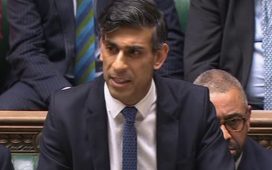The Week’s daily round-up highlights the five best opinion pieces from across the British and international media, with excerpts from each.
1. Marcus Ryder, chair of the Sir Lenny Henry Centre for Media Diversity, in The Independent
on how to save the Auntie
As a former BBC executive, I believe there is really only one solution to all of the corporation’s ills
“[New director general Tim] Davie needs fresh solutions grounded in real experiences and knowledge if he has any hope in devising new solutions to new and impending crises. Academic study after study shows that institutions come to better decisions when they have better diversity. A Boston Consulting Group study showed that companies with more diverse management have 19 per cent higher revenues due to increased innovation. Another study by Peterson Institute for International Economics proved that companies with more women in the C-Suite suite positions are more profitable. And management consultant firm McKinsey recently published a report that found corporations that embrace gender diversity on their executive teams were 21 per cent more likely to experience above-average profitability. And yet – despite its public pronouncements – the broadcaster has serious shortcomings when it comes to diversity.”
2. Angela Epstein in The Daily Telegraph
on delaying A-levels and GCSEs
If our children can manage going back to school, our politicians should be able to as well
“Even before our pupils have had a chance to shuffle into morning registration, Gavin Williamson has already indicated that public exams may be delayed next summer. Our ineffectual, position-flipping education secretary said today that he is studying plans for such a move ‘with the aim of creating more teaching time’… Has this Government learnt nothing of the profound cost paid by our children for the cancellation of this year’s GCSEs and A-levels? Their premature response to the pandemic, back in March, immediately stripped students of any kind of direction. Focus and routine were vanquished overnight, the pencil case replaced by the remote control. Parents like myself looked on with leaden hearts and in helpless despair as the months rolled by.”
3. Hugo Rifkind in The Times
on young people developing their own culture
Reckless raves are all Covid kids have left
“Legislation by successive governments did quite a lot to squash rave but what did more, almost certainly, was the growth of easier options. People moan about Glastonbury toilets but at least there are some. The natural home of dance music, meanwhile, stopped feeling like a barn or a warehouse or a field, and started feeling like those expensive superclubs you get in Ibiza that look like the inside of an Audi. Anybody inclined to moan too much about this evolution is almost certainly a bore and a pseud… Sure, it’s irresponsible. I read yesterday about a study that found people who won’t wear masks might be sociopaths and I’m fully on board with that, even if it does mean that there must have been a frankly improbable number of sociopaths in that Tesco garage we stopped in last night in Camden.”
4. Paul Krugman in The New York Times
on aid to the unemployed
Trump Had One Good Response to Covid-19. His Party Killed It.
“It may take some time before we see the full effects of this abandonment of American workers, but it’s a good bet that we’ll see slowing growth, a surge in evictions and, in general, the kind of mass suffering we managed to avoid in the first round of the Covid-19 crisis. In retrospect, then, the one praiseworthy feature of U.S. policy in this pandemic year appears to have been a lucky accident. Back in March, the economy and the markets were falling apart. Democrats had some good ideas about what to do, while Republicans had no ideas at all. And a panicked Trump let himself be rushed into doing something good. If we had brought Covid-19 under control, so that we could safely reopen more of the economy, that moment of accidental good sense might have been enough. But we didn’t, and it wasn’t. Trump did one good thing in response to the pandemic – and then he and his party killed it.”
5. Richard Seymour, political activist and author of The Twittering Machine, in The Guardian
on conspiracy theories of rightwing groups
How did the US’s mainstream right end up openly supporting vigilante terror?
“Today’s conspiracist bricolage thrives on the collapse of consensus reality, and on the disintegrating authority of older gatekeepers of truth. More importantly, it milks a fascination with the destruction of one’s enemies and, tacitly, oneself. In the past, apocalyptic fantasy has been seen as a paranoid reaction to economic deprivation and political persecution. That was true of peasant movements such as the Lazzarettists, who launched a violent revolt against the government and the ruling class in 19th-century Italy, but it hardly explains the disproportionately affluent Trump base, and it doesn’t explain rich Washington journalists such as Tucker Carlson rationalising murder in cold blood. Apocalyptic conspiracy thinking is, above all, a theodicy: it explains evil, and says what will be done about evil. The end times thinking that is sweeping the US, and justifying every new outrage, is the theodicy of groups frightened of losing their power and arming themselves to defend it.”













